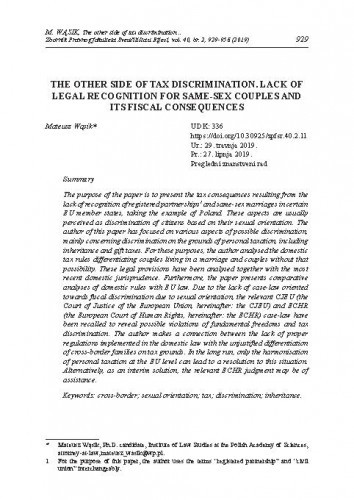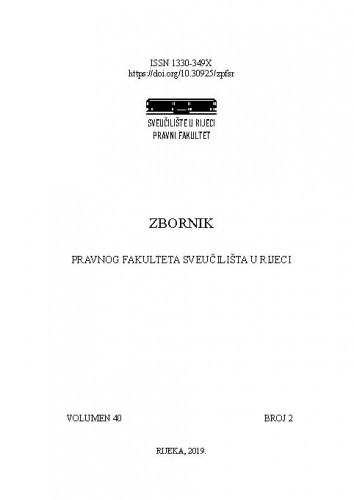The purpose of the paper is to present the tax consequences resulting from the lack of recognition of registered partnerships and same-sex marriages in certain EU member states, taking the example of Poland. These aspects are usually perceived as discrimination of citizens based on their sexual orientation. The author of this paper has focused on various aspects of possible discrimination, mainly concerning discrimination on the grounds of personal taxation, including inheritance and gift taxes. For these purposes, the author analysed the domestic tax rules differentiating couples living in a marriage and couples without that possibility. These legal provisions have been analysed together with the most recent domestic jurisprudence. Furthermore, the paper presents comparative analyses of domestic rules with EU law. Due to the lack of case-law oriented towards fiscal discrimination due to sexual orientation, the relevant CJEU (the Court of Justice of the European Union, hereinafter: the CJEU) and ECHR (the European Court of Human Rights, hereinafter: the ECHR) case-law have been recalled to reveal possible violations of fundamental freedoms and tax discrimination. The author makes a connection between the lack of proper regulations implemented in the domestic law with the unjustified differentiation of cross-border families on tax grounds. In the long run, only the harmonisation of personal taxation at the EU level can lead to a resolution to this situation. Alternatively, as an interim solution, the relevant ECHR judgment may be of assistance.; Svrha ovog rada je predstavljanje poreznih posljedica koje proizlaze iz izostanka priznavanja registriranih partnerstava i istospolnih brakova u nekim državama članicama EU-a, a kao primjer se uzima Poljska. Ovi se aspekti uglavnom smatraju diskriminacijom građana na temelju njihove spolne orijentacije. Ovaj se rad usredotočuje na različite aspekte moguće diskriminacije, posebice one temeljem osobnog poreza, što uključuje poreze na nasljedstvo i darove. Zbog toga se u radu analiziraju nacionalna porezna pravila, koja prave razliku između parova u braku i onih kojima je ta mogućnost uskraćena. Te su pravne odredbe analizirane zajedno s recentnom nacionalnom sudskom praksom. Nadalje, rad komparativno analizira nacionalna pravila i europsko pravo. Budući da postoji nedostatak sudske prakse usmjerene k fiskalnoj diskriminaciji temeljem spolne orijentacije, u radu se analizira i relevantna praksa Suda EU-a (Sud Europske unije, nadalje: Sud EU) i ESLJP-a (Europski sud za ljudska prava, nadalje: ESLJP) radi otkrivanja mogućih povreda temeljnih sloboda i porezne diskriminacije. Smatra se da je neopravdana porezna diskriminacija prekograničnih obitelji povezana s nedostatkom uređenja u nacionalnom pravu. Samo harmonizacija osobnog oporezivanja na razini EU-a može dugoročno dovesti do rješavanja ove situacije. Kao alternativa i privremeno rješenje može poslužiti i relevantna praksa ESLJP-a.
Sažetak

 Zbornik Pravnog fakulteta Sveučilišta u Rijeci : 40,2(2019) / glavni urednik Željko Bartulović.
Zbornik Pravnog fakulteta Sveučilišta u Rijeci : 40,2(2019) / glavni urednik Željko Bartulović.